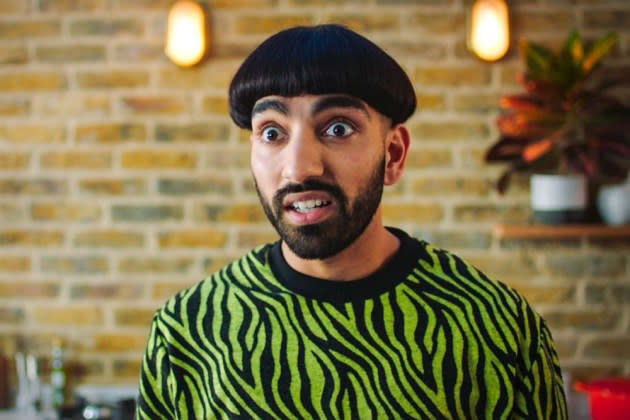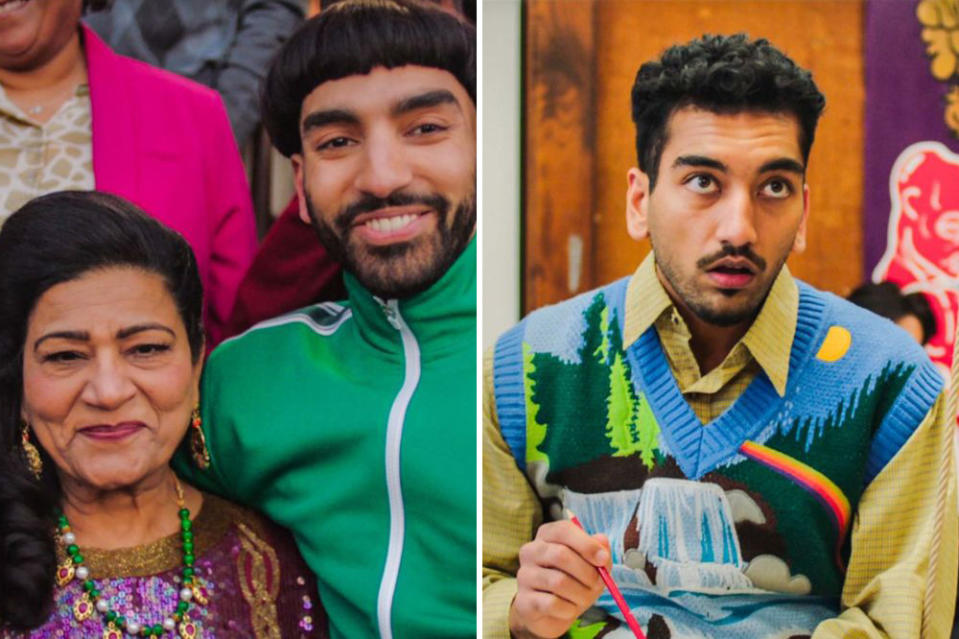Can Mawaan Rizwan Unleash His ‘Bonkers,’ BAFTA-Winning ‘Juice’ on America?

In his recent BAFTA TV Awards acceptance speech for best male performance in a comedy, British comic Mawaan Rizwan recalled a conversation with his therapist earlier that week about how he “needed to stop relying on external forms of validation… so, bad timing!”
But, just about a month after taking home the award (over the likes of David Tennant) for his BBC sitcom “Juice,” it seems like that validation is here to stay. Rizwan is currently in New York, where the first episode of the wild, cartoonish series screened to a sold-out — and, by all accounts, hugely enthusiastic — crowd at the Tribeca Film Festival on Sunday. There’s another sold-out screening on Wednesday, while a third has been hastily arranged for next Sunday to cope with demand.
More from Variety
Created and written by the 31-year-old — who himself admits it’s “bonkers” — “Juice” sees him star as Jamma, a bowl cut-sporting, colorful tracksuit-wearing millennial who encounters chaos as he navigates work life and relationships. It’s awash in slapstick, Buster Keaton-style physical comedy and Boots Riley-inspired surrealism, with Rizwan falling, wacky walking and gyrating in and out of sets that often have a mind of their own. When Jamma’s feeling anxious, things around him start to shake. When he climaxes in a pub toilet, confetti bursts from his ears.
But for all the insanity, the show is also deeply personal, centered around Rizwan’s own sexuality (he came out as gay to his Muslim parents when he was 24) and his family. Indeed, much of the story across the six episodes revolves around how his mother and brother (played by his actual mother and brother: Shahnaz Rizwan, who recently became a recognized name on Indian TV, and Nabhaan Rizwan, who has appeared in the likes of “Industry” and “1917”) keep stealing the limelight Jamma craves.
“Juice” — which stands out much like “Fleabag” did for its fresh originality — is the culmination of more than a decade of Rizwan honing his comedic craft across an eclectic assortment styles and platforms, from making amateur “silly” YouTube videos in his bedroom as a teenager, to standup shows, to performances at the Edinburgh Fringe, to writing stints on series such as “Sex Education” (“Laurie Nunn taught me everything,” he says) to increasingly regularly appearances on British TV (including as a guest on the cult show “Taskmaster”).
While this may have become a standard career trajectory for many contemporary comedians in the U.K. before branching out with their own series, Rizwan admits it’s not a route generally made available to artists such as himself — a working class guy who was born in Pakistan (his parents moved over when he was 3) with absolutely zero connections to the somewhat elitist British entertainment industry. There’s been a considerable amount of hard work and hustle along the way.
Rizwan’s first paid job actually came about in 2010 following a talk by a Pinewood Studios line producer on a filmmaking course he’d signed up for, which — after “firing off endless emails” — led to him working 12-hour shifts as a special effects runner on the Halle Berry box office bomb “Dark Tide.” His role: making the all-important titular tide by plunging a barrel into a water tank while Berry clung to a sinking ship (not that he could watch — he was strictly told he was “not allowed to look at her”). He loved it.
But now, some 14 years on and having since scaled the lofty heights of U.K. TV with the recent BAFTA honor, Rizwan is hoping to break into America. “Juice” — which has already been commissioned for a second season by the BBC that he’s now busy writing — is taking part in Tribeca as part of a push by BBC Studios to find a U.S. home. Despite the on-screen lunacy, judging by the reaction in New York and what he says is the universality of the story, Rizwan hopes it shouldn’t have much of a problem.
How did the first Tribeca screening go?
It was so fun! I just love the American vibe. Everyone was so enthusiastic about it, they kept coming up to me and quoting lines and moments. It was so nice. When people like something here they really let you know it. It made me realize I’m done with Britain!
It sounds like there’s a definite U.S. audience for the show?
Yeah, if that was any sort of litmus test. I had people saying that there was nothing like it on American television and there was a hunger for it, that there’s a quite relatable family character and a universal story, but wrapped up in a very original and surreal package.
Do you think there’s anything that might need explaining to non-Brits?
No, there’s nothing in there that doesn’t make any sense. I guess I don’t make many British references. I also feel like for a lot of diasporic people of color around the world there’s a sort of relatability. And even with a lot of queer stories, you sort of surpass national borders. It cuts through anywhere, especially when people are desperate to be seen on screen. They don’t care what accent is being used. For Season 2: Jamma is American! And we don’t reference it.
So, where did “Juice” come from? In your BAFTA speech you said you’d been trying to get it commissioned for 10 years.
I mean, it’s a bonkers show. I started out wanting to make a show where I could visualize a panic attack, but make it fun. That was the starting point. And, believe it or not, that’s a really hard sell! And I said I didn’t want any special effects, that I wanted the art department to get down and dirty. I want the audience to feel like they’re in the theme park of his emotions. But that is expensive to make and takes a lot of resources. So I think that’s why it took a while.
But it started out as a show in Edinburgh?
Yeah, it was a live show. But it was my seventh or eighth Edinburgh Fringe. Every year I would use it as an experiment. I’m from the generation where Edinburgh was so expensive to do, but where lots of people thought that if you do Edinburgh you will get your TV show. And then it was really torturous for them. But I saw it as an opportunity to go on stage every day for 30 days and just try out batshit stuff. So it took me that many years to figure out what I wanted to say and how I wanted to say it. And it just so happened that was the show that really took off.
What were your other Edinburgh shows like?
The first year I did a really hack stand up, like man and mic. The next year I wanted to reinvent myself so I did a non-verbal comedy. I did a comedy dance show one year. I was in a clown double-hander and a sketch trio. I did every genre of comedy and basically just tried on all the costumes and realized what I didn’t want to do. It was a very long-winded trial-and-error way to find my voice. But now I feel a lot more bulletproof, because I’ve taken the scenic route.
And “Juice” was the culmination of all of that?
Yeah, it was first time I put together all the clowny, physical, surreal stuff and tied it in with quite emotional and confessional stories. And I don’t think people had seen this way of telling these types of stories before. So it struck a chord. So when we came to make the TV show out of it I wanted it to have that same feeling that people had in the live show, which is, “I don’t know where this is taking me. But I’m emotionally invested. I’m also confused. And I love it.”
How did you get your mum and brother to star? You got them involved in your YouTube videos, but a deeply personal TV series on the BBC is a very different thing.
Actually, my mum was like, “Sorry my schedule is very busy.” She’s now signed with my agent! But no, I told her the story and it made her really emotional. There’s a lot of our family and our ethos as a family and our relationship in there. I remember the first day we turned up in our trailers, which were next to each other, and I thought, “Oh my God, my mum’s on set, it’s going to be chaos.” But actually we all had a bit of a tear in our eyes thinking about where we started. It’s really not a given where we come from that you can end up making a living from the arts. All the obstacles are against you. So that day we were like, we’re not only doing this, but we’re doing it together.
I’ve seen your stand-up routine about how you made your mum famous — before you — through your YouTube shows. Is that actually true?
Yeah, my mum genuinely got a role in a Bollywood show! And my brother has gone on to do amazing stuff. But we all started out in our small house making these silly videos. So the journey has been insane. I actually put my mum in my YouTube videos because I was worried she’d say, “No, you can’t do comedy as a living, that’s ridiculous.” I thought, if I get her involved, she can’t say no. I’m the mass manipulator!
How does it feel to now have acknowledgement from the British Academy?
It’s a lovely little boost. It’s very validating. And what I love is that it’s brought a whole new audience. There’s so much buzz around it now, which is so nice. Also, the speech has been doing the rounds. My publicist I think was saying it’s one of BAFTA’s most watched speeches. But it’s gone viral.
It was a great speech. I particularly enjoyed you describing the award as the “literally the least humbling thing that’s ever happened to me.” But was it all rehearsed and written down?
Honestly, I blacked out. I don’t know what I said. I was filling the silence. I genuinely didn’t think I was going to win. I mean David Tennant, come on!

Did the conversation with your therapist actually take place or was it written for laughs?
It did! Literally, unrelated to BAFTA, I was having a conversation on my therapist about not relying on external forms of validation. And then that happened. And it’s genuinely bad timing, because I’m really trying to make art from a place that’s not for that. For the shiny bit. Just make it because I want to make art. But it’s downhill from here! The BAFTA felt so good that I’m now a horrible person and only work for external forms of validation.
Should “Juice” get picked up for the U.S., do you have any hopes and dreams about what it might lead to? Is there an end game?
I try to dream big, but have zero expectations. My partner is full of these lovely sound bites that helped me in my life, and he’s like, “You show up, speak your truth but stay unattached to the outcome.” There’s that thing of just enjoying the journey. I try not to think about it too much, because I think a lot of people in our industry get a bit resentful and bitter when dreams they’ve planned out don’t come to fruition. It’s a weird mixture of having a five-year plan and also staying very loose. I don’t want to be like, “Why am I not hosting ‘SNL’ yet?” But hosting “SNL,” that’s a big dream.
Best of Variety
Sign up for Variety’s Newsletter. For the latest news, follow us on Facebook, Twitter, and Instagram.


